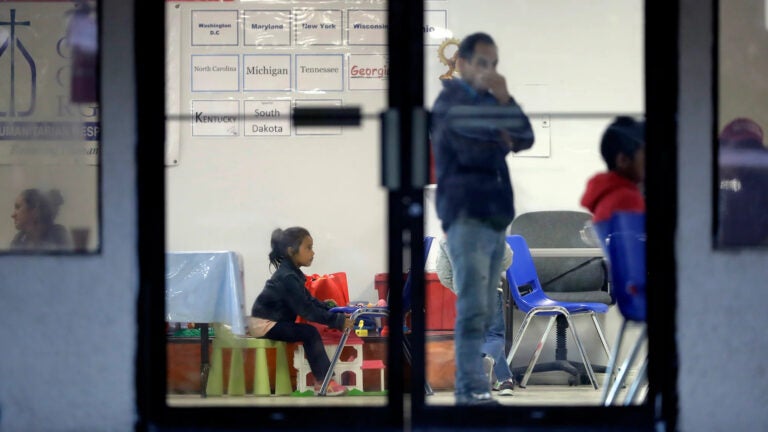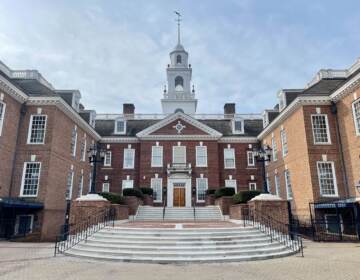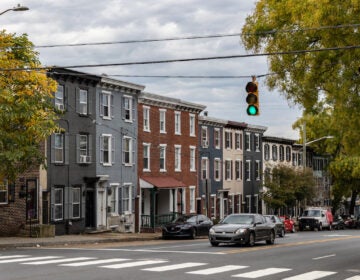Delaware’s immigrant support in crisis as little state funding and specialist shortages threaten essential services
With little to no state funding in Delaware, many nonprofits are on hiatus or closing down their immigration services.
Listen 1:40
Catholic Charities has provided immigration support in Delaware for the past decade, but that support has recently ended due to a lack of funding. Above, immigrants processed and released by U.S. Customs and Border Protection wait at the the Catholic Charities RGV, Wednesday, June 20, 2018, in McAllen, Texas. (AP Photo/Eric Gay)
From Philly and the Pa. suburbs to South Jersey and Delaware, what would you like WHYY News to cover? Let us know!
Delaware is home to more than 100,000 immigrants. Many of them rely on crucial services to navigate the challenges of daily life. Various organizations have stepped up to provide essential resources — offering support with housing, college and career guidance, victim assistance and more. However, as the need for immigration services grows, many organizations face significant challenges in meeting the demand.
Groups like Jewish Family Services, Catholic Charities Diocese of Wilmington, the Latin American Community Center and La Esperanza all support Delawareans across the state. Still, they all face two major challenges: little to no state funding and a shortage of immigration specialists. Both problems have hampered their ability to meet the growing needs of the communities they serve.
Little to no state funding strains services
Catholic Charities has provided immigration support for the past decade. However, immigrant advocate and former specialist with the organization Joanne McAfee says that service has recently ended due to a lack of funding.
“My first year of working with Catholic Charities was funded by the Raskob Foundation. And when we went back to them to ask them for a second year of funding they said no,” she said.
McAfee assisted nearly 150 families throughout her two-year tenure at the organization, building crucial trust and relationships. With the end of funding for legal services, she describes the loss as feeling like everything has been “ripped away.”
“Several of them were like, ‘Oh no, where am I going to go now?’ or ‘I don’t want to work with anybody else.’ It was hard, like my last day, I just cried,” McAfee explained. “Being given the honor of walking through these processes with them, it just means a lot to me and just understanding that they’ve been in this place of finally feeling comfortable and [to say], ‘I have this person who’s advocating for me,’ and then having that kind of ripped away?”
“It is very sad and unfortunate,” she added. “It’s been tough.”
As of Sept. 6, Catholic Charities has terminated all legal services for immigrants. They are now sending letters to affected individuals, informing them of the closure and referring them to La Esperanza in Georgetown, Delaware. Families are responsible for contacting La Esperanza for any questions or follow-ups regarding their cases.
“Recently, we’ve had Catholic Charities reach out to us and asked us if they could send the clients that they had to us, because for my understanding is that they’re not gonna be providing these services,” said Bryant Garcia, co-executive director of La Esperanza.
His group has also received calls from Jewish Family Services to assist with some cases due to high demand. However, it’s not a direct handoff; the decision to continue their cases is up to the individuals without proper documentation, as relocating might impact their ability to build trust or access transportation to the new location.
“People will go where they feel like they can get the most adequate services,” he said. “The reality is there are some organizations and bigger cities that have better resources, have language lines, [and] have abilities to communicate with a wider population.”
La Esperanza, a well-established organization serving the immigrant community across Delaware and the Delmarva region, benefits from three immigration specialists and is working to add a fourth. However, despite their efforts, the lack of state funding remains evident.
A sense of desperation
To better support the community, Maria Matos, president and CEO of the Latin American Community Center, says the center regularly conducts surveys with community members and staff to identify the most needed services. Seven years ago, that feedback revealed a significant demand for immigration services, leading the organization to address that need.
However, that effort ran into a snag with a shortage of accredited immigration specialists, who often pursue higher-paying opportunities. That’s made it difficult for LACC to sustain stable services.
“We’re on a hiatus,” Matos said, explaining that they recently lost their previous immigration specialist. “Right now, the program is on hold while we train [our] specialists to be able to take on the program.”
The training effort is a significant investment for LACC, but the outcome is uncertain due to its dependence on funding, which affects whether these specialists will stay or leave. Although increasing service fees might seem like a solution, Matos points out that the center must consider the community’s income levels. Its primary goal is to assist low-income and less fortunate individuals, which limits their ability to raise fees.
“We cannot charge a lot. It has to be affordable and that prevents us from providing that affordable service. And the salary for these specialists has to be found in some unrestricted dollars, which is also very difficult,” she said. “So the immigration program is one that is very very difficult to provide because of the lack of funding and the fact that we’re nonprofit.”
Fortunately, they have filled the vacant position, but services won’t resume until January 2025. The new specialist is currently in Lancaster, Pennsylvania, completing training and shadowing other experts to obtain accreditation.
While the immediate problem has been resolved, Matos is deeply frustrated by the ongoing issues. She argues that navigating immigration should not be so tricky, especially given the critical lack of resources in the field.
“Desesperada,” she said. “Desperate because it’s a community that is in dire need and from the top down from the federal government on that immigration doesn’t seem to be as important as it’s been in the past, and it’s frustrating because these people bring value for culture to a community.”

Get daily updates from WHYY News!
WHYY is your source for fact-based, in-depth journalism and information. As a nonprofit organization, we rely on financial support from readers like you. Please give today.







